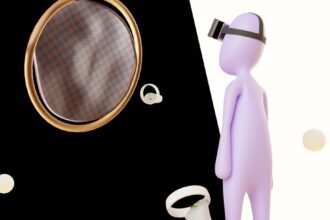Toxic positivity is a term that has gained traction in recent years, and it refers to the excessive and insincere promotion of a positive mindset, often at the expense of genuine emotional expression. You may have encountered situations where someone dismisses your feelings or experiences with phrases like “Just think positive!
” While positivity can be beneficial, it becomes toxic when it invalidates your emotions and discourages authentic communication. This phenomenon can create an environment where you feel pressured to suppress your true feelings, leading to a disconnect in your relationships.
At its core, toxic positivity stems from a societal belief that happiness is the ultimate goal. You might find yourself in conversations where the emphasis is placed solely on maintaining a cheerful facade, leaving little room for vulnerability or honest discussions about struggles. This can be particularly damaging in close relationships, where emotional support and understanding are crucial.
Recognizing toxic positivity is the first step toward fostering healthier interactions, as it allows you to navigate your feelings and those of others more effectively.
Key Takeaways
- Toxic positivity is the belief that one should only focus on positive emotions and reject any negative feelings, which can be harmful in relationships and mental health.
- Signs of toxic positivity in relationships include dismissing or invalidating negative emotions, pressuring others to “just be positive,” and avoiding difficult conversations.
- Toxic positivity can have a negative impact on mental health, leading to suppression of emotions, increased stress, and feelings of inadequacy.
- It can lead to unhealthy dynamics in relationships by creating a lack of authenticity, communication barriers, and a sense of invalidation for genuine emotions.
- Overcoming toxic positivity in relationships involves acknowledging and validating all emotions, setting boundaries, and fostering open and honest communication.
Signs of Toxic Positivity in Relationships
In your relationships, you may notice certain signs that indicate the presence of toxic positivity. One common indicator is the tendency for one partner to consistently downplay the other’s feelings. If you find that your concerns are met with platitudes rather than empathy, it may signal a toxic dynamic.
For instance, when you share your worries about a job loss and the response is a dismissive “Everything happens for a reason,” it can leave you feeling unheard and invalidated. This pattern can erode trust and intimacy over time. Another sign of toxic positivity is the avoidance of difficult conversations.
You might feel that discussing negative emotions or challenges is frowned upon, leading to a culture of silence in your relationship. If you or your partner frequently resort to superficial affirmations instead of addressing underlying issues, it can create a barrier to genuine connection. Recognizing these signs is essential for breaking the cycle of toxic positivity and fostering a more open and supportive environment.
Impact of Toxic Positivity on Mental Health

The impact of toxic positivity on mental health can be profound and far-reaching. When you are constantly encouraged to suppress negative emotions, it can lead to feelings of isolation and inadequacy. You may start to believe that your struggles are invalid or that you should be able to overcome them without assistance.
This internalized pressure can contribute to anxiety, depression, and a host of other mental health challenges. The inability to express your true feelings can create a sense of disconnection from yourself and those around you. Moreover, toxic positivity can hinder personal growth.
When you avoid confronting difficult emotions, you miss out on valuable opportunities for self-reflection and healing. You may find yourself stuck in a cycle of denial, unable to process your experiences fully. This stagnation can lead to resentment and frustration, both within yourself and in your relationships.
Acknowledging the impact of toxic positivity on your mental health is crucial for breaking free from its grasp and fostering a more balanced emotional landscape.
How Toxic Positivity Can Lead to Unhealthy Dynamics
| Aspects | Effects |
|---|---|
| Dismissal of Negative Emotions | Invalidates genuine feelings and prevents healthy emotional processing |
| Pressure to Always Be Positive | Creates unrealistic expectations and adds to feelings of inadequacy |
| Suppression of Authenticity | Encourages hiding true emotions and thoughts, leading to inauthentic relationships |
| Failure to Address Real Issues | Prevents addressing underlying problems and hinders personal growth |
Toxic positivity can create unhealthy dynamics in relationships by fostering an environment where vulnerability is discouraged. When you or your partner feel compelled to maintain a facade of happiness, it can lead to a lack of authenticity in your interactions. You may find yourselves engaging in superficial conversations rather than addressing deeper issues that require attention.
This avoidance can breed resentment and misunderstandings, ultimately eroding the foundation of trust that is essential for any healthy relationship. Additionally, toxic positivity can create power imbalances within relationships. If one partner consistently adopts a “cheerful” demeanor while dismissing the other’s struggles, it can lead to feelings of inferiority or inadequacy.
You might feel as though your emotions are less valid or that you are burdening your partner by expressing them. This dynamic can create a cycle where one person feels compelled to hide their true self while the other remains oblivious to the emotional turmoil beneath the surface.
Overcoming Toxic Positivity in Relationships
Overcoming toxic positivity requires intentional effort from both partners. The first step is acknowledging its presence and understanding how it affects your relationship. You may want to initiate an open conversation with your partner about the importance of validating each other’s feelings.
By creating a safe space for emotional expression, you can begin to dismantle the barriers that toxic positivity has erected between you. Another effective strategy is to practice active listening. When your partner shares their feelings, make a conscious effort to listen without judgment or interruption.
You might find it helpful to reflect back what you’ve heard, demonstrating that you understand their perspective. This practice not only fosters empathy but also encourages both partners to express their emotions more freely, paving the way for deeper connection and understanding.
Setting Boundaries with Toxic Positivity

Setting boundaries is essential when dealing with toxic positivity in relationships. You have the right to express your feelings without fear of dismissal or invalidation. It’s important to communicate your needs clearly to your partner, letting them know when their attempts at positivity feel overwhelming or unhelpful.
For instance, if you’re going through a tough time and they respond with overly optimistic platitudes, gently remind them that you need space to process your emotions rather than being pushed toward a positive outlook. Establishing boundaries also involves recognizing when you might be engaging in toxic positivity yourself. You may find yourself defaulting to positive affirmations when friends or loved ones share their struggles.
By being mindful of this tendency, you can consciously choose to respond with empathy instead. Setting these boundaries not only protects your emotional well-being but also encourages healthier interactions within your relationships.
Communicating Effectively in the Face of Toxic Positivity
Effective communication is key when navigating toxic positivity in relationships. When discussing difficult emotions, strive for honesty while remaining compassionate.
For example, saying “I appreciate your desire to help me feel better, but I really need to talk about what I’m going through” opens the door for dialogue without creating defensiveness. Additionally, consider using “I” statements to convey your feelings more clearly. Phrases like “I feel overwhelmed when my emotions are dismissed” can help articulate your experience without sounding accusatory.
This approach fosters understanding and encourages your partner to engage in meaningful conversations about emotional well-being.
Seeking Professional Help for Toxic Positivity in Relationships
Sometimes, overcoming toxic positivity requires external support from a professional therapist or counselor. If you find that discussions about emotions consistently lead to conflict or misunderstanding, seeking help can provide valuable tools for navigating these challenges. A therapist can help both partners understand the roots of their behaviors and develop healthier communication strategies.
In therapy, you may explore underlying beliefs about emotions and how they impact your relationship dynamics. A trained professional can guide you through exercises designed to foster empathy and understanding between partners, allowing both individuals to express their feelings authentically without fear of judgment.
Healing from the Effects of Toxic Positivity
Healing from the effects of toxic positivity takes time and patience. It’s essential to acknowledge the emotional toll it has taken on you and allow yourself space to process those feelings fully. You might find journaling helpful as a means of reflecting on your experiences and identifying patterns in how you respond to emotions—both yours and those of others.
Engaging in self-care practices can also aid in healing from toxic positivity’s effects. Whether it’s through mindfulness meditation, physical activity, or creative outlets, prioritizing activities that nurture your emotional well-being can help restore balance in your life. Surrounding yourself with supportive individuals who encourage authenticity will further reinforce your journey toward healing.
Cultivating Healthy Positivity in Relationships
Cultivating healthy positivity involves embracing a balanced approach to emotions within relationships. Instead of dismissing negative feelings outright, focus on creating an environment where both positive and negative emotions are acknowledged and validated. Encourage open discussions about challenges while also celebrating successes together.
You might also consider incorporating practices that promote gratitude and appreciation without overshadowing difficult emotions. For instance, sharing what you’re grateful for at the end of each day can foster a sense of connection while still allowing space for vulnerability when needed. This balanced approach helps build resilience within relationships and encourages both partners to support each other authentically.
Nurturing Authenticity and Vulnerability in Relationships
Nurturing authenticity and vulnerability is crucial for overcoming toxic positivity in relationships. Embrace the idea that it’s okay not to be okay sometimes; this acknowledgment fosters deeper connections between partners. You might find it helpful to share personal stories or experiences that highlight moments of struggle alongside triumphs, reinforcing the notion that vulnerability is a strength rather than a weakness.
Encouraging each other to express true feelings creates an atmosphere where both partners feel safe being themselves without fear of judgment or dismissal. By prioritizing authenticity in your interactions, you lay the groundwork for a more profound emotional connection that transcends superficial positivity—ultimately leading to healthier and more fulfilling relationships. In conclusion, navigating toxic positivity requires awareness, communication, and intentional effort from both partners involved in a relationship.
By recognizing its signs and impacts, setting boundaries, and fostering open dialogue about emotions, you can cultivate healthier dynamics that prioritize authenticity over superficial cheerfulness. Embracing vulnerability not only strengthens connections but also paves the way for genuine support during life’s ups and downs—creating a foundation for lasting love and understanding.
Toxic positivity in relationships can often lead to a suppression of genuine emotions, creating an environment where individuals feel pressured to maintain a facade of happiness. This can be detrimental to emotional intimacy and authenticity between partners. For a deeper understanding of how such dynamics can affect relationships, you might find the article on Unplugged Psych insightful. It explores various psychological aspects that can influence personal interactions. You can read more about it by visiting Unplugged Psych.
WATCH NOW! 😔 The Hidden Cost of Forced Positivity
FAQs
What is toxic positivity in relationships?
Toxic positivity in relationships refers to the excessive and unhealthy focus on only positive emotions and the denial, minimization, or invalidation of any negative emotions or experiences within the relationship.
How does toxic positivity affect relationships?
Toxic positivity can negatively impact relationships by creating an environment where one or both partners feel pressured to suppress their true feelings and experiences, leading to emotional disconnection, lack of authenticity, and unresolved issues.
What are the signs of toxic positivity in a relationship?
Signs of toxic positivity in a relationship may include dismissing or invalidating negative emotions, pressuring the other person to “just be positive,” avoiding difficult conversations, and denying the existence of problems or challenges.
How can toxic positivity be addressed in relationships?
Addressing toxic positivity in relationships involves creating a safe space for open and honest communication, validating each other’s emotions, acknowledging and addressing challenges, and seeking professional help if needed.
What are the potential consequences of toxic positivity in relationships?
The potential consequences of toxic positivity in relationships may include emotional suppression, resentment, lack of trust, communication breakdown, and the inability to resolve underlying issues, leading to long-term damage to the relationship.




